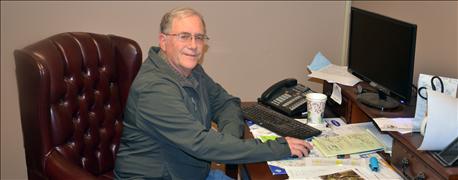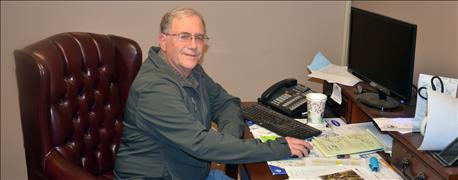
Don Zolman told a crowd of farmers earlier this year that one of the most important things he ever did for his business was to seek out a mentor. The person wasn’t even a farmer. Zolman admired him for his business ethics and success. But he didn’t just look up to this person.
“I met with him and formally asked him if he would be my mentor,” Zolman says. “It was a big deal to me.”
Zolman has looked to others through the years for advice on no-till and cover crops. Today, others look to him. Many people believe one of the best things you can do is find a mentor for whatever it is that you want to do better. That's the lead topic in this edition of "Salute Soil Health."

SEEK OUT A MENTOR: Who do you look up to that could give you advice on no-till and cover crops? Don Zolman says mentors are a key part of his farming success.
Some of this information was prepared by Indiana Conservation Partnership personnel, led by a team of Natural Resources Conservation Service staff. They include Don Donovan, Brian Musser and Clint Harrison, district conservationists; Susannah Hinds, grazing specialist; Scot Haley, resource soil scientist; Kris Vance, public affairs specialist; Victor Shelton, state agronomist/grazing specialist; Tony Bailey, state conservation agronomist; and Shannon Zezula, state resource conservationist.
Seek a mentor
The overall goal of Salute Soil Health is helping Indiana farmers who are new to no-till, cover crops and other soil health practices glean information that will make their efforts to achieve better soil health successful. These articles provide valuable basic information. However, Donovan recommends you also reach out to farmers in your community with experience in building soil health to help you. Be a sponge and soak up as much valuable information as you can from them.
Donovan has seen that nothing is better for farmers wanting to use these practices on their farms than to learn from an experienced mentor to ensure their move to a soil health system is successful. If you need some guidance on who might be a good soil health mentor in your area, stop by the local NRCS/soil and water conservation district office to get some insight.
A mentor can help you take everything you have learned and target it specifically to your farm.
Attend winter conservation meetings
Indiana farmers who have successfully developed their no-till and cover crop systems value the importance of winter conferences and field days. These events provide valuable information from other successful farmers who use no-till and cover crops in their systems. Some are even held on a conservation farmer’s farm.
Donovan explains that it’s also one of the best starting places for farmers who are new to no-till and cover crops. You will learn what to do and what not to do, increasing your chances of early success.
In Indiana, the Conservation Cropping Systems Initiative serves as a clearinghouse of information on no-till systems, cover crops and soil health. Farmer events related to conservation throughout the state and region are posted on the CCSI website, with event information located under the Soil Health Events tab.
There you will find a list of current scheduled events. You can sign up for a weekly email newsletter that will keep you up to date. CCSI also has a Facebook page that provides timely information on soil health in Indiana.
About the Author(s)
You May Also Like




